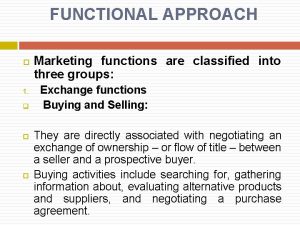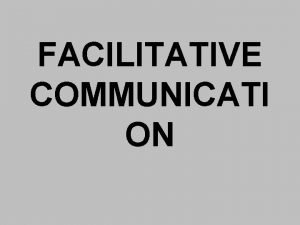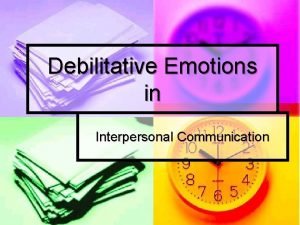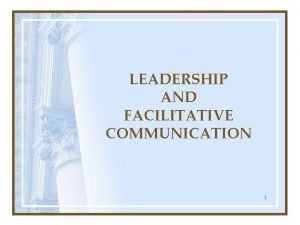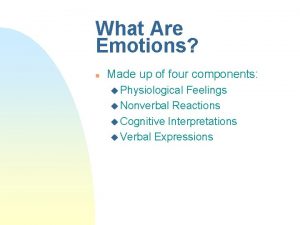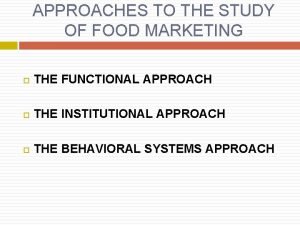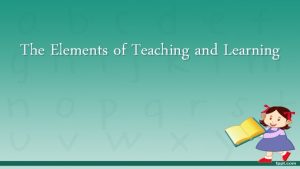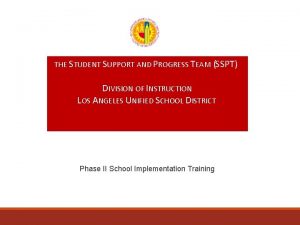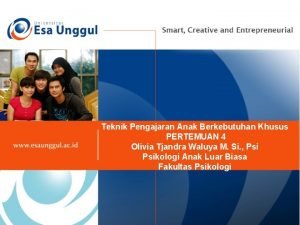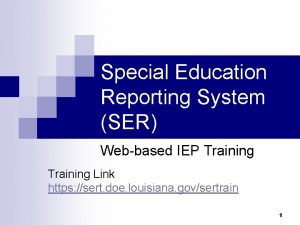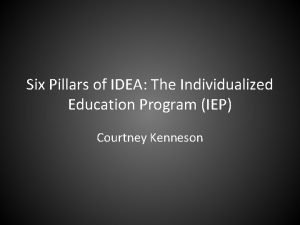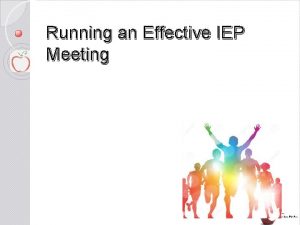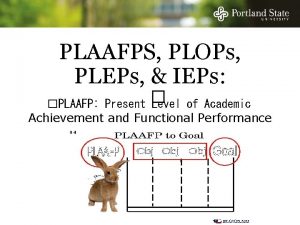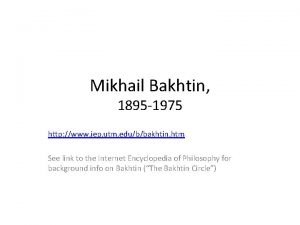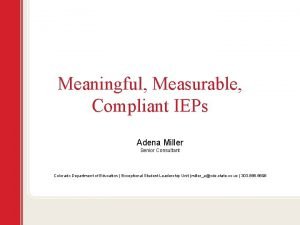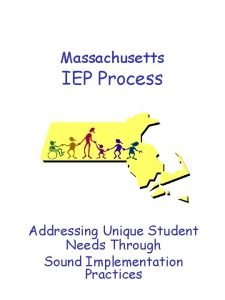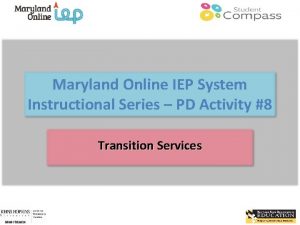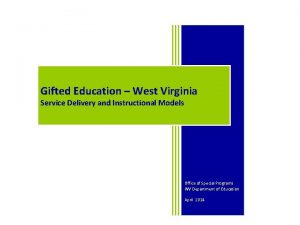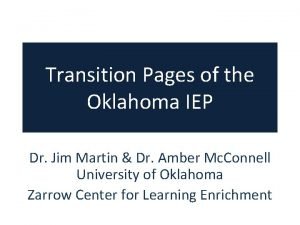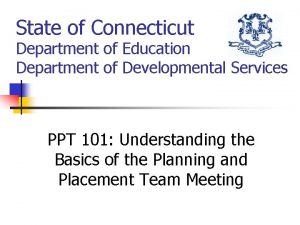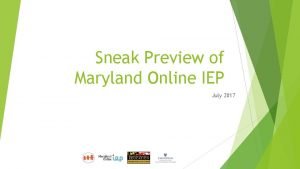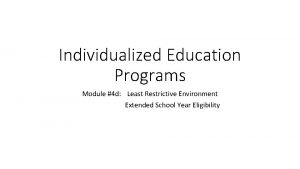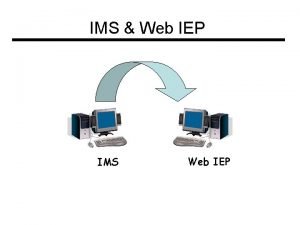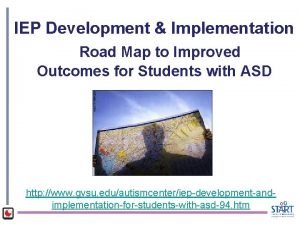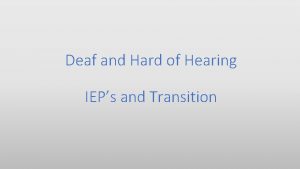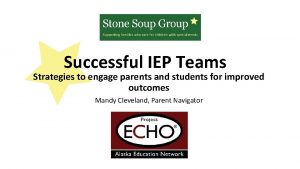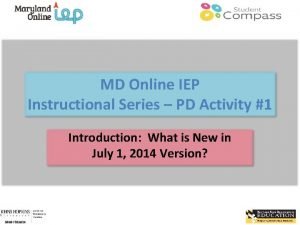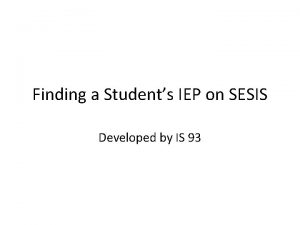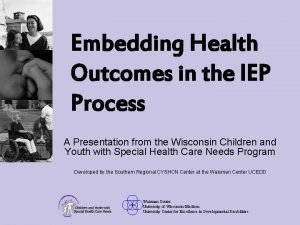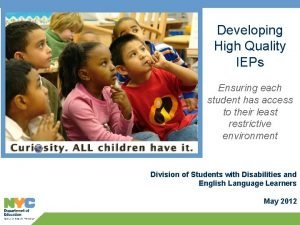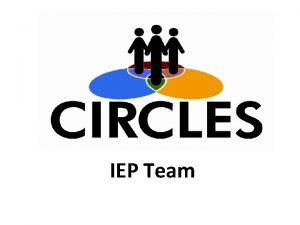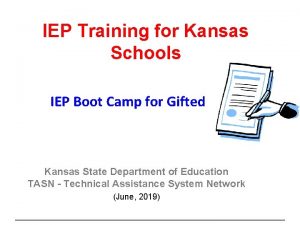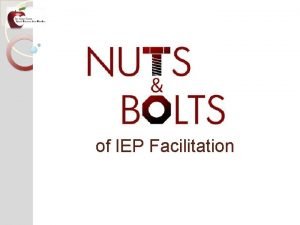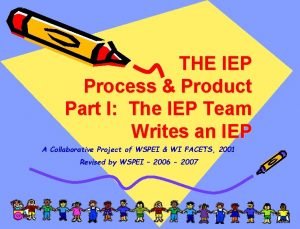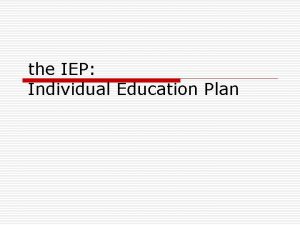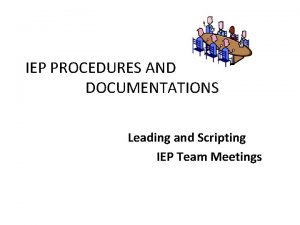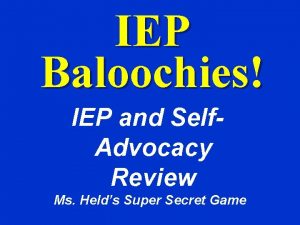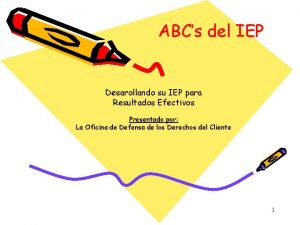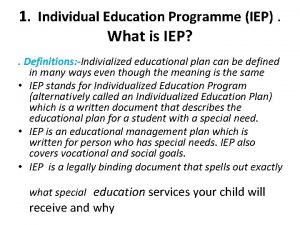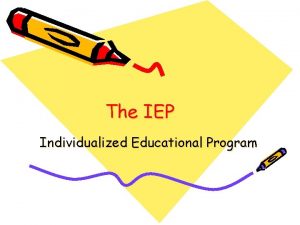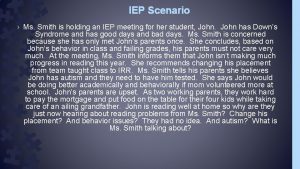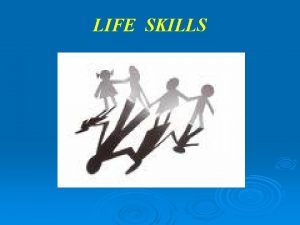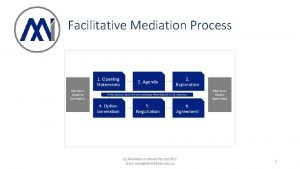The Use of Facilitative Skills in the IEP







































- Slides: 39

The Use of Facilitative Skills in the IEP Process Mary Anne Fleury, Ph. D. - Colorado Department of Education 1 ACRES Conference 2020

Mission: To provide a funded support system and toolbox of options, for ALL special education stakeholders in order to increase a more collaborative IEP process and relationships The Curriculum The curriculum was developed for and approved by the Colorado Department of Education. 2

The Challenge ▪ Most special education conflict centers on the development of the IEP. ▪ A natural imbalance of power exists that results in parents feeling undervalued in the IEP process. ▪ School staff members, administrators, and families often become focused on disagreement and engaged in a relationship strained by unresolved conflict. ▪ School districts are spending over $90 million per year nationally on conflict resolution. 3

In Rural Special Education: • There are fewer special educators doing the work of many • We run our own meetings • We work with families for many years • Contention can impact collaboration for years

Therefore: • • Positive relationships are vital Tools are needed to run smoother meetings Collaboration is crucial Parent understanding is essential

Colorado’s Dispute Resolution Statistics 100 90 80 70 60 50 40 30 20 10 0 2018 2019 Mediations 41 81 85 State Complaints 18 44 75 Due Processes 22 46 47 IEP Facilitation Requests 0 44 93 Note: The Special Education population in Colorado has grown by 19, 278 from 2010 -2018.

FINDINGS OF STATE COMPLAINTS Districts Cited For Lack of: • • • Parent Participation Implementation of the IEP Development of the IEP Comprehensive Evaluations Appropriate IEP Team Members Prior Written Notice 7

FINDINGS OF STATE COMPLAINTS • Failure to conduct Comprehensive Evaluations or consider • • Independent Evaluations Failure to determine Eligibility/Child Find Amendments made outside of IEP meeting Failure to provide parents with progress monitoring IEP not implemented at beginning of school year 8


Our Solution: Facilitative Skills for all IEP Stakeholders THE BEST SOLUTION FOR RESOLVING CONFLICT AND BUILDING COHESIVE TEAMS. When are facilitative skills helpful? ▪ EVERY day. ▪ At EVERY IEP team meeting. ▪ Before disagreements become disputes. 10

Benefits of Facilitation According to the American Bar Association, benefits include: Parties get to decide : All parties, who know the student, control the outcome. Fosters continuing relationships : Facilitation does not dismantle relationships, it bolsters them. Facilitation deals with feelings : It respects that a child is at the heart of every disagreement. Outcomes are durable : There is a higher level of satisfaction, resulting in more durable agreements. Lower cost : Informal issue resolution is ALWAYS less costly than more formal options. Cost is measured on the human and financial dimensions. 11

Purpose of Using Facilitative Skills Maintain open communication among all members, using active listening skills Assist team in understanding resistance and resolving conflicts through consensus decision-making Needs of the Child Help team members stay on task and on time 12 Help IEP team members develop and ask clarifying questions

Taste of Our Training! 13

IDEA: Know with Precision Free Appropriate Public Education Least Restrictive Environment Special Education & Related Services 14

Conflict is a signal or message that something is not working and needs to be different. ~ Talk Through Conflict Using Interest-Based Problem Solving, Education Service Center Region 4 (2011). ~ 15

Conflict Wheel ▪ When we understand the source of conflict, we can find a way to work through it. ▪ Different sources of conflict produce different challenges. ▪ Find the PRIMARY source(s) of the conflict to find a solution.

Active Listening Techniques 17

YOUR WORDS: Affirms the speaker. 18

Mirror SPEAKERS WORDS: Help the speaker feel understood. 19

Reframe Negative to Neutral: Remove the Toxicity REFRAME 20

Positions vs. Interests Dig deep. Agreement lies in finding the interests underneath and behind the positions. 21

Clarifying Questions Focus on Open Ended Questions Open Ended Problem Solving Directed Yes/No 22

Space of Change The concept of space is both mental and physical. Be strategic in creating the space of change. Speak when you are angry and you will make the best speech you will ever regret. ~Ambrose Bierce 23

Powerful Tools! Used in Successful IEP Meetings ▪ VISUALS! ▪ Aid in understanding ▪ Keeps team on track ▪ Neutralizes information ▪ ▪ ▪ Opening Statement Checklist Agenda Development Form Parent Input Form Comprehensive Evaluation Wheel FAPE Continuum 24

The Opening Sets the Tone ▪ Welcome and Introductions ▪ Recognize and affirm participation and commitment ▪ Explain purpose of the meeting ▪ Explain agenda use and purpose ▪ Explain meeting norms and seek agreement (if used) 25

Productive Meetings Agendas Are living documents. 26

Parent Reports ▪ Purpose is to gain input from the parent, as well as provide meaningful input, and an opportunity for parents to report at the meeting. Report can include: ▪ ▪ Student strengths Behavioral performance Social interaction Parent concerns 27 27

It Begins with a Comprehensive Evaluation • Without a clear understanding of the student’s educational needs, it is impossible to determine FAPE. • Educational needs means academic, functional, social, or behavioral. • It is a probing question model. 28

The FAPE Continuum Evaluation 29 Present Levels & Need Measurable Goals Services in the LRE Educational Benefit

Alternative Dispute Resolution in Colorado • Prevention-based • Alternative Dispute Resolution Advisory Board (ADRAB) current focus: • Educator training • Parent resources • Restorative Justice practices • Trainings: • Improving IEP Teams: Skills for Resolving Conflict trainings • Facilitator trainings • Specific district requests • Trainings for parent groups • Services: • 4 Statewide IEP Facilitators available to support meetings 30

Colorado’s ADR Data Snapshot Fall of 2017 -Present • Trainings • 654 trained in the Improving IEP Teams: Skills for Resolving Conflict • 128 trained as neutral IEP Facilitators • Skills taught at multiple conferences and shortened trainings in districts • 99. 5% of participants’ survey responses found the training extremely helpful in their day-to-day IEP meetings, with the visual tools as very valuable. • Facilitations • 176 requests for statewide facilitators • Has this reduced the likelihood that other Dispute Resolution options will be utilized? • 72% of respondents in the IEP meetings facilitated by a statewide facilitator said YES. (See slide 35) 31

Evaluation Data from Facilitations in 2019 -2020 32

Evaluation Data from Facilitations in 2019 -2020 33

Evaluation Data from Facilitations in 2019 -2020 Outcome of Facilitated IEPs 34

Evaluation Data from Facilitations in 2019 -2020 This question has been changed to a Likert scale for 2020. 35

36

Facilitation Continuum No matter your role, facilitation skills are invaluable and there are many options for engagement! Use of Facilitation Skills By All IEP Members Impartial Facilitator From the District, a Neighboring District or Community Agency 37 Impartial Statewide Facilitator

38

Questions? • Mary Anne Fleury, Ph. D. , CDE Alternative Dispute Resolution Specialist 303 -866 -6649 fleury_m@cde. state. co. us 5/13/2020 39 39
 Example of functional approach in marketing
Example of functional approach in marketing What does facilitate mean
What does facilitate mean Debilitative emotions
Debilitative emotions 7 strategies of communication
7 strategies of communication Facilitative communication
Facilitative communication What are emotions
What are emotions Facilitative middlemen
Facilitative middlemen Fundamental equipment of the learner
Fundamental equipment of the learner Iep meeting quotes
Iep meeting quotes Sspt forms lausd
Sspt forms lausd Contoh iep anak berkebutuhan khusus
Contoh iep anak berkebutuhan khusus Https serp doe louisiana gov ser
Https serp doe louisiana gov ser Parts of an iep
Parts of an iep Iep meeting agenda
Iep meeting agenda Plaafp
Plaafp Iep utm edu
Iep utm edu Md online iep
Md online iep Carol kosnitsky
Carol kosnitsky Sample iep for 4 year old
Sample iep for 4 year old Marylandonline iep
Marylandonline iep Iep development
Iep development Iep meeting agenda
Iep meeting agenda Oral expression sld
Oral expression sld Intellectually gifted
Intellectually gifted Iep goal for citing textual evidence
Iep goal for citing textual evidence Oklahoma iep
Oklahoma iep Student-led conference script
Student-led conference script Iep components special education
Iep components special education Online iep md
Online iep md Least restrictive environment statement examples
Least restrictive environment statement examples Webiep
Webiep Iep development and implementation
Iep development and implementation Virgen
Virgen Wvde iep
Wvde iep Gifted iep goals
Gifted iep goals Iep
Iep Md online iep
Md online iep Sesis iep
Sesis iep Iep
Iep Quality services iep
Quality services iep
